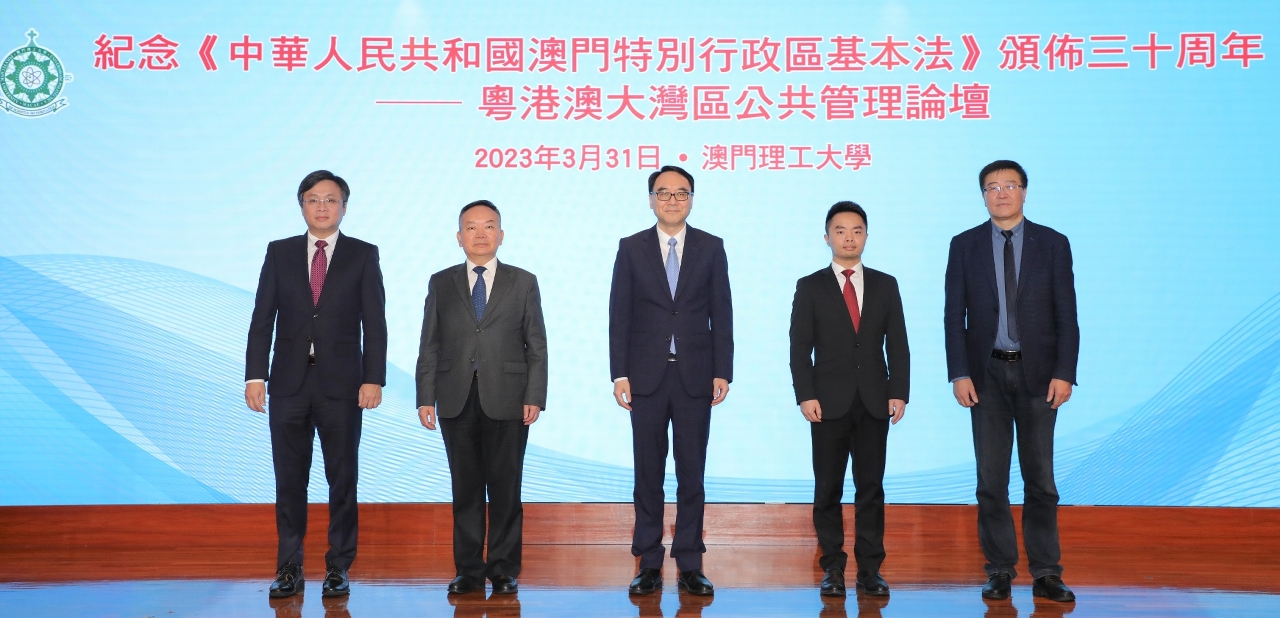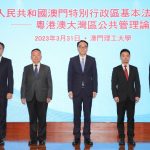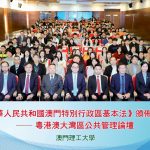 Macao Polytechnic University held a seminar commemorating the 30th anniversary of the promulgation of the Macao Basic Law
Macao Polytechnic University held a seminar commemorating the 30th anniversary of the promulgation of the Macao Basic Law
To commemorate the 30th anniversary of the promulgation of the "Macao Basic Law of the Macao Special Administrative Region of the People's Republic of China", Macao Polytechnic University held the "Guangdong-Hong Kong-Macao Greater Bay Area Public Management Forum" for two consecutive days starting from March 31st. More than 100 participants, including officials from the Macao SAR government, experts and scholars from the Mainland, Guangdong-Hong Kong-Macao Greater Bay Area and Macao, as well as teachers and students from higher education institutions and other members of the community, attended the event to promote academic exchanges and cooperation in the field of public management in the Greater Bay Area and to create a regional academic exchange platform.
The opening ceremony of the forum was held at Macao Polytechnic University at 3 pm on March 31st. Director of the Education and Youth Affairs Department of the Liaison Office of the Central People's Government in the Macao Special Administrative Region, Li Xuefei, Director of the Policy Research and Regional Development Bureau of the Macao SAR Government, Zhang Zuowen, Deputy Director of the Education and Youth Development Bureau, Ding Shaoxiong, Rector of Macao Polytechnic University, Im Sio Kei, and Dean of the School of Government of Peking University, Yan Jirong, officiated at the ceremony.
Im Sio Kei said in his speech that the Macao Basic Law promulgated 30 years ago is the foundation for the development of Macao and the fundamental guarantee for its steady and long-term development. The 20th National Congress report of this year summarized the practical experience of "One country, Two systems", and proposed the important principles for implementing the policy of "One country, Two systems" in the new era. This has pointed out the direction for the future development of Macao. At the same time, the Guangdong-Hong Kong-Macao Greater Bay Area, which has been a demonstration new area for social and public management in recent years, has also become the focus of attention for development of "One country, Two systems". Macao Polytechnic University has always attached great importance to promoting the education of the Basic Law, and has been deeply involved in the teaching and research work in the field of public management. It has set up a "One Country, Two Systems" Research Centre, launched a compulsory course of "Constitution and Basic Law", and offered undergraduate, master, and doctoral degree programs in public administration, public management, and public policy, so as to give full play to the advantages of disciplines and regional influence. On the occasion of commemorating the 30th anniversary of the promulgation of the Macao Basic Law, MPU held the first Guangdong-Hong Kong-Macao Greater Bay Area Public Management Forum under the theme of "Regional Cooperation in the New Era" to discuss how to build a new pattern of regional cooperation that is open, inclusive and mutually reinforcing, giving full play to the new synergy of the Greater Bay Area, and further promoting Macao's integration into the overall development of the country.
Yan Jirong delivered a speech as a representative of scholars, reviewing the history of the promulgation of the Macao Basic Law, and stating that the institutional roots of Macao's social prosperity and stability are attributed to the Macao Basic Law with which the system of "One country, Two systems" is supported and guaranteed. The "One country, Two systems" initiative supported by the Macao Basic Law is an important part of "Chinese-style modernization". At the same time, promoting the construction of the Guangdong-Hong Kong-Macao Greater Bay Area is a major national decision and national strategy, and it is also a new practice to promote the development of "One country, Two systems". From the multidisciplinary perspectives of politics, economics, sociology, law and public management; research regional synergy and cooperation mechanisms; urban governance and the formation of urban cluster effects; solutions for common regional problems; and to challenges and opportunities for regional coordinated development—all are the shared responsibilities of scholars. It is hoped that through this forum, we will join forces to expand broader academic cooperation and exchanges.
He Zhihui, an Associate Professor at the "One Country, Two Systems" Research Centre of MPU, affirmed that the Macao Basic Law clearly stipulates that Macao will be a special administrative region after its return to the motherland, and the basic political, economic, and legal systems required for the full implementation of "One Country, Two Systems" will play a role in the development of Macao in the post-transition period. It plays a guiding role in stabilizing the direction, and together with the Chinese Constitution embodies the constitutional basis of the Macao SAR after the reunification, and it has a pivotal position in the legal system of the Macao SAR. The Macao Basic Law provides the most solid legal guarantee for the full implementation of "One country, Two systems" in Macao, and also lays the institutional foundation for the SAR government to carry out social, cultural, and people's livelihood construction work. As the connotation of "One country, Two systems" has been continuously enriched in the process of practice, residents of the Macao SAR have also obtained more comprehensive basic rights and fuller protection of freedom than any time in history.
The forum was organized by the Faculty of Humanities and Social Sciences and the "One Country, Two Systems" Research Centre of MPU and had a total of six parts. In the sub-forum on "Direction for Regional Cooperation Development", speeches were delivered by Dean of the Faculty of Humanities and Social Sciences of MPU, Lam Fat Iam; Professor of the Department of Public and International Affairs of Hong Kong City University, Li Che La; Dean of the School of Government of Peking University, Yan Jirong; and Professor of the School of Government of Sun Yat-sen University, Yue Jinglun. In the sub-forum on "Practice of 'One Country, Two Systems'", speeches were delivered by Deputy Dean of the School of Public Administration and Policy of Renmin University of China, Yang Hongshan; Professor of the Zhou Enlai School of Nankai University, Zhu Jiangang; and Associate professor of the MPU "One Country Two Systems" Research Centre, He Zhihui. In the sub-forum on " Regional Environmental Governance", speeches were delivered by Professor of the Institute of Public Administration of the Party School of the Guangdong Provincial Committee of the Chinese Communist Party, Yue Fangmin; Professor of the Faculty of Humanities and Social Sciences of MPU, Li Lue; and Associate Professor of the School of Government of Sun Yat-sen University, Chen Na. In the sub-forum on "Regional Population Flow", speeches were delivered by Associate Professor of the School of Government of Sun Yat-sen University, Chen Yongjie; Associate Professor of the School of Public Administration of South China Agricultural University, Liu Juan; Associate Professor of the Faculty of Humanities and Social Sciences of MPU, Zhang Tao; and Associate Professor of the School of Urban Design of Wuhan University, Gong Yue. In the sub-forum on "Regional Cooperation Comparison", speeches were delivered by Professor of the Institute of Economics and Management of Southwestern University of Finance and Economics, Zhao Guochang; Associate Professor of the Faculty of Humanities and Social Sciences of MPU, Yin Yifen; Dr. Liang Yuquing form the School of Government of Shenzhen University; and Lecturer of the Faculty of Humanities and Social Sciences of MPU, Yang Zhenjie. At the "Forum for Editor-in-Chief of Journal", speeches were delivered by Professor of University of Macau, Ngo Tak-Wing, who is the editor-in-chief of the SSCI journal "China Information", and Professor of Sun Yat-sen University, Yue Jinglun, who is the editor-in-chief of the CSSCI journal "China Public Policy Review".



